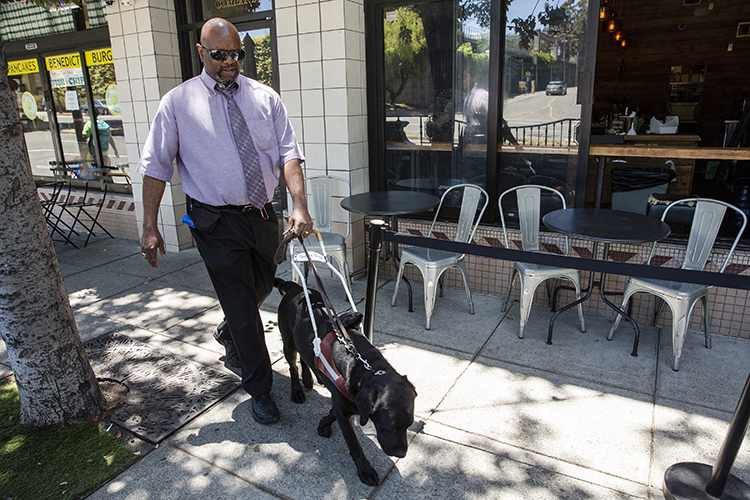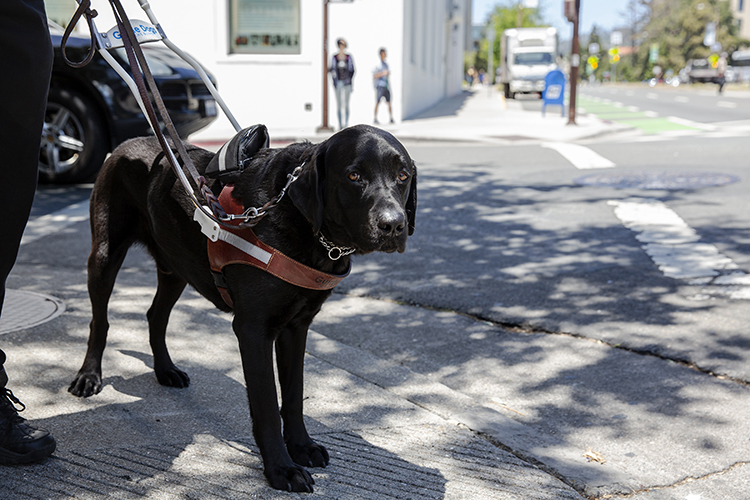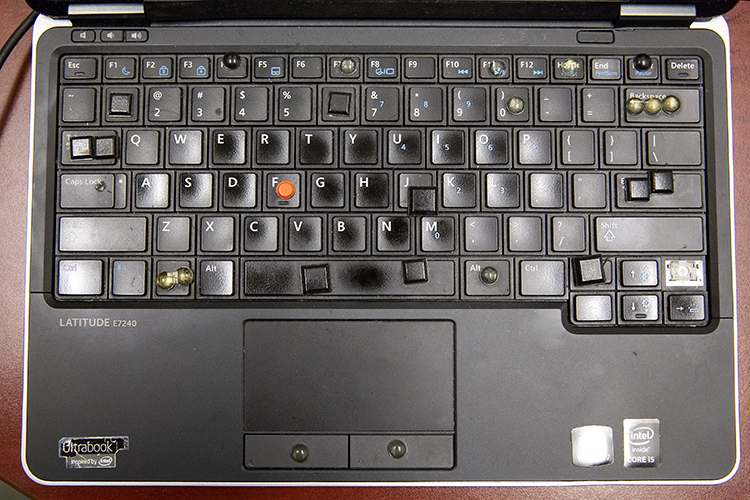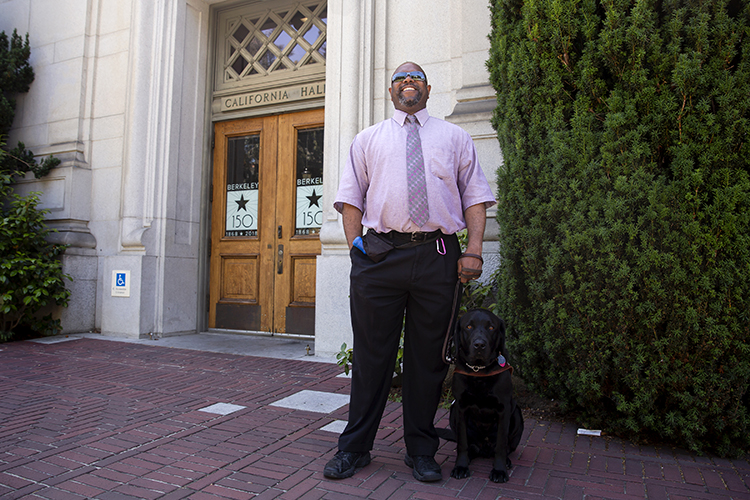Podcast: For disability advocate, helping students navigate campus is personal
As a disability compliance officer at UC Berkeley, Derek Coates makes sure students with disabilities are getting the accommodations they need to be academically successful
July 17, 2018
When Derek Coates was 10, he found out he had a degenerative eye disease and was going to gradually lose his eyesight. Over the next 30 years, his visual world shrunk until he became completely blind at 41. Now, as a disability compliance officer at UC Berkeley, it’s his job to make sure students with disabilities are getting the accommodations they need to be academically successful.

Derek Coates is a disability compliance officer at UC Berkeley. (UC Berkeley photo by Brittany Hosea-Small)
Following are excerpts from Derek Coates’ interview with Berkeley News. It has been edited for clarity.
Berkeley News: What do you do as a disability compliance officer at UC Berkeley?
Derek Coates: I make sure students with disabilities are getting the accommodations they need to be academically successful at Berkeley. It’s about communicating with the department, communicating with the students, communicating with the Disabled Students’ Program specialist, finding a way to make sure that we’re all on the same page moving forward.
This morning, I had to talk to a department because they have a graduate student who isn’t making satisfactory academic progress. The student has a disability that had become exacerbated, so they were getting incompletes. This morning, I was talking to the graduate adviser about how to fix it.
At the end of the day, the point is to find out, okay, what’s going on? Are the compensatory strategies engaged? Is the support system engaged? The student has already demonstrated, because they were admitted, that they can do the work. But the disability pulls them away from being able to perform those academic tasks.

Derek walks with his seeing eye dog, Afton, down a Berkeley sidewalk on his way to a meeting at California Hall. (UC Berkeley photo by Brittany Hosea-Small)

Derek waits with Afton at a street light. Afton, a black lab, walks with Derek on busy sidewalks, across streets and along the campus paths. (UC Berkeley photo by Brittany Hosea-Small)
What is considered to be a disability?
It can be anything that impacts a substantial life activity. There are so many different disabilities that could impact a major life activity that can create barriers to a person’s capacity to be academically successful. It could be physical, in terms of mobility-based or sensory-based. But a lot of people are stuck on the invisible disabilities side.
On the invisible side of disability, you’ve got a whole host of things. It could be chronic pain, it could be arthritis, it could be diabetes, it could be Irritable Bowel Syndrome. And we’re still in the physical body with these. We haven’t even gotten to the head yet. In the head, you could have bipolar disorder, you could have ADHD, you could have a learning disability, you could have dysphasia, depression, anxiety.
How can a student with a disability apply for services at Berkeley?
When a student with a disability comes to campus and needs special accommodations, they should visit the Disabled Students’ Program, either online or in person, and apply for services. They’ll be asked to send in medical documentation. Then, they request an intake appointment with a specialist, where they’ll look at the student’s medical documentation, the courses the student is registered and talk about how the disability impacts the student. Then, together, they will decide what sort of accommodations would mitigate the symptoms.
The student will then go online and request these accommodations for each class. A letter is sent to each faculty member, who is required by university policy PACHOUSE 140.0 to implement these accommodations. And I recommend students bring a letter of accommodation to each class if they have to negotiate the implementation of an accommodation (e.g., extended time on exams or assignments, etc.).
If the student is questioned about their disability, they should have a specialist’s business card ready and hand it to the faculty member and ask them to call the specialist to discuss the requirements.

Derek has a program on his computer called Job Access with Speech that reads all text aloud to him. (UC Berkeley photo by Brittany Hosea-Small)

Derek’s laptop has small rubber tabs placed on specific keys as markers. (UC Berkeley photo by Brittany Hosea-Small)
What programs do you use that allow you to be successful at your job?
I have installed on my computer a program called JobAccess, which reads everything aloud to me. If you are a student, you may receive a license from the Disabled Students’ Program. And I use an app on my iPhone called Seeing Eye GPS, but it is not as helpful as I would like since it cannot pinpoint where a specific door to a business is on a given street.
If people have questions about disability compliance, where should they go?
They should visit Berkeley’s Disability Compliance website at https://disabilitycompliance.berkeley.edu/ or contact me by email at [email protected] or by phone at (510) 643-8996.

(UC Berkeley photo by Brittany Hosea-Small)